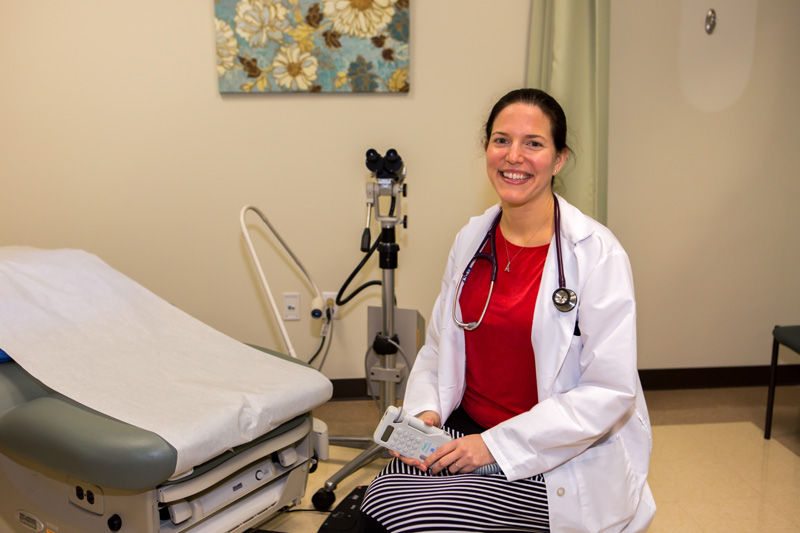Twenty years ago, there weren’t many treatment options for chemotherapy-resistant ovarian cancer, but Dr. Daniela Shapiro, a Vero Beach oncologist, says that is changing due to the introduction of “targeted” therapies.
Targeted therapies impact specific cell mechanisms thought to be important for cancer growth, blocking the signals that tell cancer cells to grow and divide. Because of this focus, targeted treatments tend to spare healthy cells and cause less severe side effects than broad spectrum chemotherapy.
Dr. Shapiro spoke specifically of drugs that inhibit angiogenesis – the process by which new blood vessels are formed. Some cancerous tumors are very efficient at creating new blood vessels, which increases blood supply to the tumor and allows it to grow. “Angiogenesis inhibitors prevent new blood vessels from forming,” Dr. Shapiro says. “This can help stop the spread of ovarian cancer.”
Further down the line, a new study from Harvard Medical School researchers suggests gene therapy may become an effective anti-ovarian cancer tool.
The study, which was published in the Proceedings of the National Academy of Sciences, reports that tumor cells from patients with “chemoresistant” ovarian cancer were grafted onto mice, and a single injection of a protein called Mullerian Inhibiting Substance (MIS) was given. The researchers found that in some cases this single injection of MIS stopped the growth of ovarian cancer tumors in the mice.
Lead author Dr. David Pépin says, “If further study confirms the susceptibility of chemoresistant tumors to this MIS gene therapy, the ability to inhibit tumor recurrence could significantly extend patient survival.”
Vero’s Dr. Shapiro says the results of the study are impressive. “It may be another ten years before we see it in practice, but it makes sense. The world of oncology is changing very fast.”
Ovarian cancer is a growth of abnormal malignant cells that begins in the ovaries – the almond-sized reproductive glands that produce ova and the hormones estrogen and progesterone. These malignant cells can spread to other parts of the body through the bloodstream or lymph modes or move directly to other organs in the pelvis and abdomen.
According to the CDC (Centers for Disease Control and Prevention) almost 21,000 women in the United States are diagnosed with ovarian cancer each year. It accounts for only about 3 percent of all cancers in women, but is the 5th leading cause cancer death (following lung and bronchia, breast, colorectal, and pancreatic cancers).
There is an inherited genetic mutation related to ovarian cancer which has been in the news of late, thanks to the candor of actress, director and humanitarian Angelina Jolie. Her mother, Marcheline Bertrand, died of ovarian cancer at the age of 56 and Jolie discovered that she herself had a mutation in “breast cancer gene 1” (BRCA1), which dramatically increases the risk for breast and ovarian cancer. Jolie underwent a preventive double mastectomy in 2013 and removal of her ovaries earlier this year.
These breast cancer gene mutations are rare – they are found in only 2 percent to 4 percent of women – but they are responsible for about 10 to 15 percent of all ovarian cancers. They are more likely to be found in those with a family history of breast and ovarian cancer and those with personal risk factors, such as being of Eastern European or Jewish descent.
Smoking can double the risk of certain kinds of ovarian cancer; other risk factors include:
- Increasing age. While ovarian cancer can occur in women of any age, rates are highest in woman aged 55-64.
- Number of menstrual cycles. Research indicates an increased risk if any of the following is true: the woman started menstruating before age 12, has not given birth, gave birth to her first child after age 30, experienced menopause after age 50, or has never taken oral contraceptives.
- Hormone replacement therapy used to alleviate symptoms of menopause. Recent studies indicate that using a combination of estrogen and progestin for five or more years significantly increases the risk of ovarian cancer in women who have not had a hysterectomy; 10 or more years of estrogen use increases the risk of ovarian cancer in women who have had a hysterectomy.
- Obesity. A 2009 study found that obesity was associated with an almost 80 percent higher risk of ovarian cancer in women aged 50 to 71 who had not taken hormones after menopause.
In addition to targeted therapies and chemotherapy, surgery is sometimes used to treat ovarian cancer. Unfortunately, there are no early symptoms of this type of cancer and it frequently goes undetected until it has spread, making it more difficult to treat.
Dr. Shapiro advises women to be aware of their family histories and of their own bodies. “If you notice that something’s different, even if it’s vague, see your doctor, especially if the symptoms persist and especially if you have a family history of ovarian cancer.”
Dr. Shapiro practices as part of Scott, Weeks & McGarry, located at 1460 36th St in Vero Beach; the office number is 772-562-7777.

